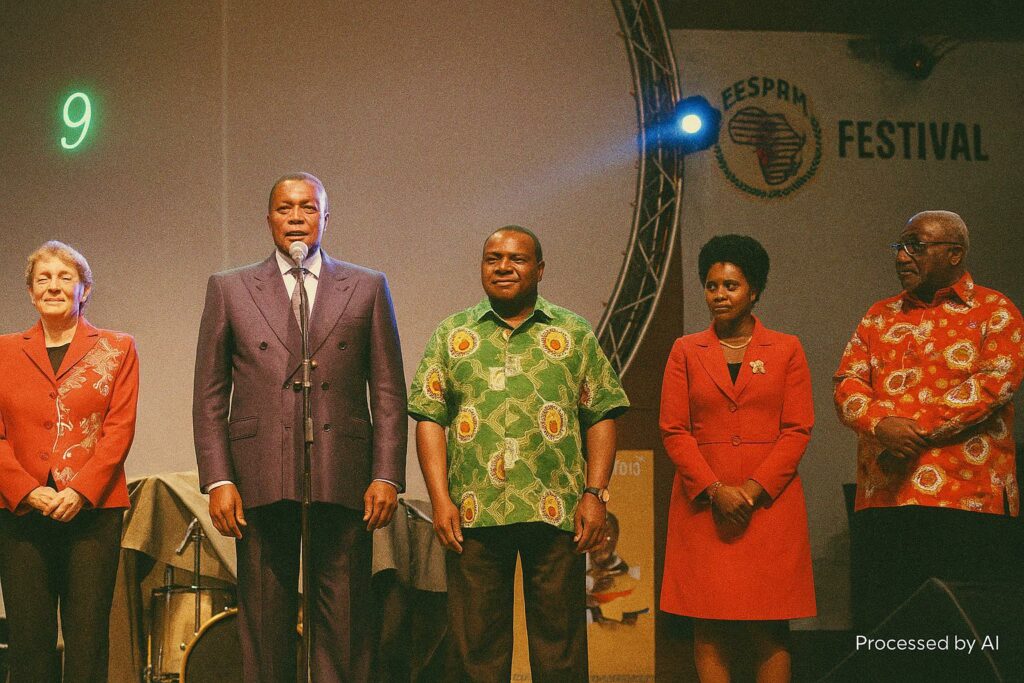A ceremonial overture in Brazzaville
High noon sunlight filtered through the atrium of Brazzaville’s Palais des Congrès as President Denis Sassou Nguesso pronounced the dozen-word formula that shifted the capital’s mood from weekday routine to festival cadence. His declaration opened the twelfth Pan-African Music Festival, better known by its French acronym Fespam, and was greeted by the resonance of traditional Congolese drums carefully miked for global streaming. The ceremony’s protocol combined military precision with artistic exuberance, reflecting an administration that has long positioned culture as a pillar of nation branding.
Economic headwinds meet cultural resolve
The Republic of Congo remains under the disciplined gaze of international lenders, its post-pandemic budgetary space narrow and its hydrocarbon revenues subject to price volatility. Within this context the decision to maintain Fespam, albeit in reduced format, signals what one senior official called a “strategic refusal of cultural austerity”. Only fourteen delegations—half the usual contingent—made the journey, but their presence allows Brazzaville to project continuity rather than retrenchment. Analysts of the sub-regional economy note that cultural events generate indirect revenue through hospitality, logistics and media rights even when direct public expenditure is capped.
Digital disruption as organising theme
The 2025 edition is curated around the motto “Music and Economic Stakes in Africa’s Digital Era”, echoing studies by the African Union and the International Telecommunication Union that identify creative industries as a growth frontier. Panels scheduled alongside concerts explore streaming monetisation, intellectual-property enforcement and blockchain-based royalty tracking. Minister of Culture Lydie Pongault told reporters that “the smartphone has become the new mbé of the griot; it amplifies but also commodifies our heritage, demanding governance rather than nostalgia”. Her remarks align with UNESCO data showing that Africa still captures less than two percent of the global recorded-music revenue despite commanding more than fifteen percent of global mobile-subscriber growth (UNESCO 2021, ITU 2023).
Soft-power dividends and diplomatic optics
Beyond economic calculus, Fespam functions as an instrument of soft power. Congolese diplomats privately underscore how cultural convening offsets security narratives that often dominate external media coverage of Central Africa. The opening night guest list included envoys from the African Union, the European Union and several Gulf states, all courted through backstage dialogues framed around cultural exchange funds. A West-African ambassador described the festival as “a rehearsal space for diplomatic improvisation”, noting that informal conversations over repertoire choices sometimes unlock formal cooperation on broader dossiers such as visa facilitation.
Artists navigate opportunity and restraint
For performers, the festival’s downsized logistics present both constraints and rare visibility. Cameroonian afro-jazz guitarist Kareyce Fotso, performing on the riverfront stage, observed that “a shorter bill forces curators to be more selective, which paradoxically magnifies each slot”. Congolese rumba veteran Roga Roga, meanwhile, filmed rehearsal footage for instantaneous release on global platforms, illustrating how artists leverage digital immediacy to expand reach beyond the physical venue. Local start-ups offered near-field payment bracelets to audiences, showcasing home-grown innovation compatible with the festival’s theme.
Looking past the final encore
Whether Fespam can translate its digital rhetoric into durable market gains remains to be measured after the stages dim. The Ministry of Culture has signalled that it will publish, in partnership with the Economic Commission for Africa, an impact assessment tracking streaming spikes and tourist flows linked to the festival. Early ambitions include a permanent music-tech incubator in Brazzaville and a revised copyright statute scheduled for parliamentary debate in the next ordinary session. Stakeholders thus view the current edition less as a celebratory exception than as a pilot for policy experimentation. As the last chords reverberate along the Congo River, the festival’s legacy will depend on the state’s capacity to harmonise fiscal prudence with cultural audacity.

